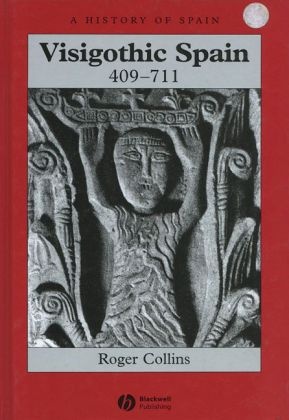Share
Fr. 184.90
COLLINS, R Collins, Roger Collins, Roger (University of Edinburgh) Collins
Visigothic Spain 409 - 711
English · Hardback
Shipping usually within 1 to 3 weeks (not available at short notice)
Description
Informationen zum Autor William Wilkie Collins (8 January 1824 - 23 September 1889) was an English novelist, playwright and short story writer best known for The Woman in White (1859) and The Moonstone (1868). The last has been called the first modern English detective novel. Born to the family of a painter, William Collins, in London, he grew up in Italy and France, learning French and Italian. He began work as a clerk for a tea merchant. After his first novel, Antonina, appeared in 1850, he met Charles Dickens, who became a close friend and mentor. Some of Collins's works appeared first in Dickens's journals All the Year Round and Household Words and they collaborated on drama and fiction. Collins achieved financial stability and an international following with his best known works in the 1860s, but began suffering from gout. Taking opium for the pain grew into an addiction. In the 1870s and 1880s his writing quality declined with his health. Collins was critical of the institution of marriage: he split his time between Caroline Graves and his common-law wife Martha Rudd, with whom he had three children. Klappentext Between the end of Roman rule in the early fifth century and the Arab conquest in the eighth, Spain's destiny lay with the Visigoths, a confederacy of different ethnic groups formed in the Balkans in the later fourth century. Taking account of important new documentary evidence and of the latest archaeological findings, the author presents a wealth of original theories, challenging many traditional assumptions about Visigothic Spain - about how the Visigothic kingdom was governed, law in the kingdom, the nature and methods of the Arab conquest, and the rise of Spain as an intellectual force in the West. The book falls into two parts: the first providing a chronological overview of political and military events; the second reviewing the evidence for social life and organization in Visigothic Spain. A historiographical introduction summarizes the current state of research on the history and archaeology of the period. Zusammenfassung Presents the history of Spain in the period between the end of Roman rule and the time of the Arab conquest. This book shows how the Visigothic kingdom was governed! about law in the kingdom! about the Arab conquest! and about the rise of Spain as an intellectual force. Inhaltsverzeichnis List of Maps. Introduction: Visigothic Spain in the Twenty-First Century. Part I: A Political History: . 1. From Empire to Kingdom, 409-507:. A Turning Point. The Visigoths. The Gothic Conquests of Hispania, 456-507. 2. The Imposition of Unity, 507-586:. A Fractured Kingdom. The Reign of Leovigild, 569-586. 3. The Catholic Kingdom, 586-672:. Conversion and Reaction, 586-590. Changing Dynasties, 590-642. Kings and the Political Elite, 642-672. 4. Visigothic Twilight, 672-710:. Court Conspiracies, 672-681. The Uneasy Throne, 681-710. 5. The End of the Kingdom:. The Coming of the Arabs. The Last Kings, 710-713. Part II: Society and Culture: . 6. Books and Readers:. The Legacy of Africa. The Golden Age. 7. Archaeology: Cemeteries and Churches:. Goths in the Ground. A Visigothic Architecture?. 8. Archaeology: Rural and Urban Settlements:. Country Dwellers. Towns in Transition. 9. Law and Ethnic Identity:. The Fog of the Law. Gothia and Hispania. Bibliographical Essay. Index ...
List of contents
List of Maps.
Introduction: Visigothic Spain in the Twenty-First Century.
Part I: A Political History: .
1. From Empire to Kingdom, 409-507:.
A Turning Point.
The Visigoths.
The Gothic Conquests of Hispania, 456-507.
2. The Imposition of Unity, 507-586:.
A Fractured Kingdom.
The Reign of Leovigild, 569-586.
3. The Catholic Kingdom, 586-672:.
Conversion and Reaction, 586-590.
Changing Dynasties, 590-642.
Kings and the Political Elite, 642-672.
4. Visigothic Twilight, 672-710:.
Court Conspiracies, 672-681.
The Uneasy Throne, 681-710.
5. The End of the Kingdom:.
The Coming of the Arabs.
The Last Kings, 710-713.
Part II: Society and Culture: .
6. Books and Readers:.
The Legacy of Africa.
The Golden Age.
7. Archaeology: Cemeteries and Churches:.
Goths in the Ground.
A Visigothic Architecture?.
8. Archaeology: Rural and Urban Settlements:.
Country Dwellers.
Towns in Transition.
9. Law and Ethnic Identity:.
The Fog of the Law.
Gothia and Hispania.
Bibliographical Essay.
Index
Report
"Readers interested in more detailed accounts of Spanish history will ... find this book very accessible." British Bulletin of Publications
"There is much to admire and enjoy in this volume ... highly readable and impressively researched work." History
Product details
| Authors | COLLINS, R Collins, Roger Collins, Roger (University of Edinburgh) Collins |
| Publisher | Wiley, John and Sons Ltd |
| Languages | English |
| Product format | Hardback |
| Released | 26.03.2004 |
| EAN | 9780631181859 |
| ISBN | 978-0-631-18185-9 |
| No. of pages | 272 |
| Series |
History of Spain A History of Spain A History of Spain History of Spain |
| Subject |
Humanities, art, music
> History
|
Customer reviews
No reviews have been written for this item yet. Write the first review and be helpful to other users when they decide on a purchase.
Write a review
Thumbs up or thumbs down? Write your own review.

